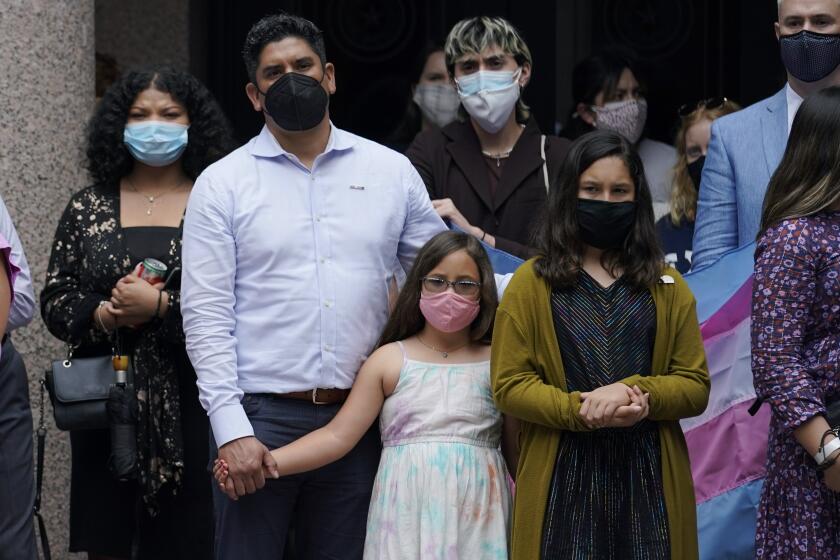A Texas sports radio host moved to Hawaii to protect his trans son. Few can do likewise

- Share via
WASHINGTON — Rachel Gonzales, 39, has thought a lot about what she would do if child welfare agents came to her home in Dallas to investigate whether her 12-year-old daughter is receiving gender-affirming care. She’s hired an attorney, given all three of her children the phone number, and told them to call the lawyer if anyone shows up when she and her husband are away from home.
But Gonzales is not making plans to move west from Texas, even after Gov. Gavin Newsom signed a law recently making California a “sanctuary” for families with transgender children.
“I don’t know if I would say we’re comfortable, but we are unwilling to move our children, who are thriving in their school and have tons of friends,” she said. “And it’s absolutely ridiculous to upturn their lives because of political theater.”
Families like Gonzales’ face a dilemma as governors and lawmakers in conservative-led states propose or enact policies intended to limit or halt access to sports teams, school facilities and medical treatment for transgender students and in some cases threatening to punish families.
Some Americans with trans children are moving to blue states. Some are considering it. But the vast majority are staying home — either because they want to or they have no choice. Worries they won’t find jobs or affordable housing top the list of concerns. Some just don’t want to leave family behind or find new friends. And those who do move will have to find teachers, principals, neighbors and pediatricians who understand the specific needs of a transgender child.
“It sucks that we have to make this kind of decision,” said Mike Taylor, 47, who moved to Hawaii from Texas in 2020 to raise his 10-year-old transgender son. “I can be comfortable and be who I am, maybe be a little less well off, or keep my house in Texas but never get to leave it because of who I am.”
In February, Texas Gov. Greg Abbott, a Republican, directed the state’s Department of Family and Protective Services to treat hormone therapy, puberty blockers and other gender-affirming care as potential acts of child abuse.
“Texas law imposes reporting requirements upon all licensed professionals who have direct contact with children who may be subject to such abuse, including doctors, nurses, and teachers, and provides criminal penalties for failure to report such child abuse,” Abbott wrote, extending the duty to report to “members of the general public.”
Gov. Gavin Newsom signed a bill that will protect transgender youths fleeing laws in red states that ban gender-affirming care.
He went on to direct state agencies to investigate parents and “licensed facilities where such procedures may occur.”
Courts have temporarily blocked the directive, but the department says it opened 13 cases, four of which are not yet closed.
Tracy Harting, an attorney representing three Texas families under investigation, said one of her clients has not sought medical treatment for their 13-year-old child, but was still reported for supporting the child’s social transition.
A department spokeswoman said she does not comment on individual cases. Abbott’s office did not respond to questions about the effect of his directive on families.
Families with transgender children and their advocates say they are in limbo. They worry how the next court ruling or legislative session might affect their lives.
The World Professional Assn. for Transgender Health guidelines say hormone treatment can begin at 14 in some cases but cautions that medical professionals should consider other criteria, including a child’s emotional maturity.
Newsom signed a law late last month intended to shield out-of-state families from policies in other states that were intended to limit care or punish families of transgender children, including protections from subpoenas and the release of medical information. The California law also faces a potential court challenge.
A transgender musician comes out to several family members over the phone and composes a new song.
Trans rights advocates are pleased but compare such laws to protections California and other states are giving to people seeking abortions. The laws make a statement, but only a few people can actually leave their home states on even a temporary basis.
“It’s nice that Gavin Newsom will say ‘sanctuary.’ But on the other hand, are they offering people relocation money and jobs and housing? No,” said Susan Stryker, a historian, filmmaker and author of transgender history who is a research fellow at the Stanford University Humanities Center.
Stryker understands the urge to find a welcoming place. She grew up in Oklahoma, moved to Berkeley for graduate school 40 years ago and stayed in the San Francisco Bay Area. But while she once felt that trans people were subjected to “malignant neglect,” she believes they are now the targets of “a deliberate policy to make life increasingly unlivable,” she said.
“It’s not just that there’s a pull factor for queer folks to leave places where their lives are harder,” she said. “But it’s an active push.”
Erica Anderson took more than half a century to come out as a woman. Now she works with teens in a rush to transition.
Kathie Moehlig, executive director of Trans Families Support Services, a San Diego-based group that co-sponsored the California bill, acknowledges that “folks that are moving here from other states are in a privileged percentage of people.” But over the eight years since her group launched, her team has heard from 3,000 trans people and their families across the country who wanted answers to questions such as where they can get medical care or how they can live safely in their own states, she said.
Moehlig points to a variety of recent measures that have raised trans Americans’ anxiety level. Oklahoma Gov. Kevin Stitt signed a bill Oct. 5 that will effectively end medical care for trans minors at one of the state’s largest hospital groups. Florida banned the use of Medicaid funds for transgender healthcare, regardless of age, in August. An Alabama law that makes it a crime for doctors to prescribe drugs to minors is on hold pending a court review.
“There’s not a whole lot of states saying ‘We will stand up and protect you if have to travel here,’” she said.
Gonzales, the Dallas mom, said she knows several families who have left Texas for states including Colorado, Washington, Oregon, Connecticut, Vermont, California and Arizona. But her reasons for staying speak to the difficulty of starting fresh. Even as the legal environment around her has grown more threatening, she and her family have worked to build a network of friends, teachers, administrators and doctors who support their daughter.
Money for a move to California is a huge obstacle, especially for families who seek to live in liberal cities like Los Angeles and San Francisco, which have some of the highest housing prices in the nation.
Taylor, the father who moved to Hawaii, has found the change extremely difficult. He had to leave behind a house, friends and two adult children from a previous relationship and had to make financial compromises to adjust to the much higher cost of living in Honolulu. But he still considers himself lucky. One friend with a transgender child owns a business in Texas, he said, and cannot leave. Another is waiting to see what happens in the next legislative session while hatching backup plans to live in Chicago.
Taylor was able to keep his job as a sports radio host in San Antonio and Austin, waking up before 6 a.m. most days to catch up on local college football, NBA basketball or whatever other topics his listeners want to discuss. He watches Dallas Cowboys and San Antonio Spurs games on satellite or streaming.
He travels back and forth often — for work and to see his girlfriend and his adult children.
Children who begin identifying as transgender at a young age tend to retain that identity for several years at least, a new study suggests.
But protecting his child is worth getting up early and traveling more, he said. At the beginning of the pandemic, he and his then-wife felt the winds changing.
“The last seven [to] eight years, you could just sense politically in that state, there was a movement to come after the transgender community,” he said.
He saw debates in Houston over bathroom access and in the state Legislature over a religious freedom bill that many LGBTQ advocates viewed as an attempt to limit their rights. It was part of a lengthy personal transition for a father who came of age in the macho sports radio culture believing “Texas is best” and “everything else is second.”
“We put a bunch of blue states in a hat and we researched all of them as best we could,” he said.
After settling on Hawaii, Taylor and his then-wife cold-called schools to make sure the teachers and staff would be sensitive. The move has worked out, for the most part, he said. Texas friends with trans kids are living on a knife’s edge, knowing a court ruling or new law could upend their lives.
“We’re lucky that we got to come here, but it’s been very hard,” he said. “I miss my family. I feel like a fish out of water. But we’re here for him.”
More to Read
Get the L.A. Times Politics newsletter
Deeply reported insights into legislation, politics and policy from Sacramento, Washington and beyond. In your inbox twice per week.
You may occasionally receive promotional content from the Los Angeles Times.












